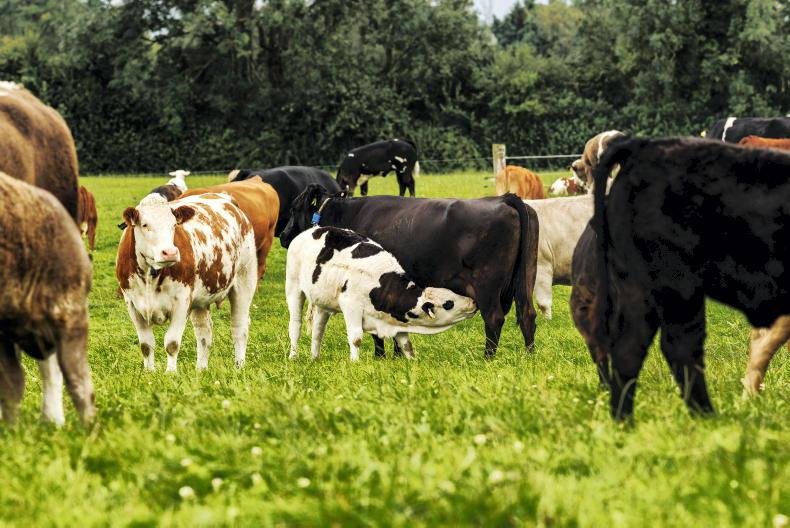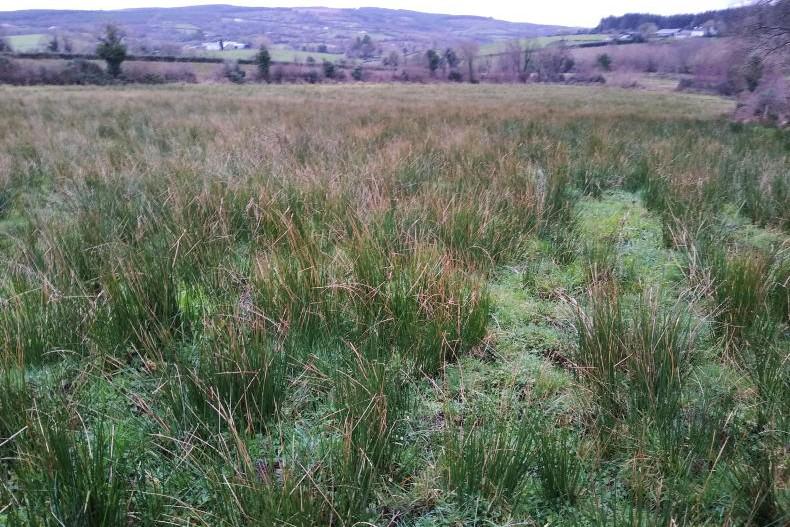A public consultation on future agricultural policy proposals has been launched by NI Farm Minister Edwin Poots.
Open for eight weeks to midnight on 15 February 2022, industry views are sought across a number of different components of a new programme.
While there is no radical overhaul expected before 2024, outside of the EU, DAERA officials maintain there is more scope to set policies directly relevant to NI farmers, and more flexibility to make changes into the future.
The bulk of the current direct payments will initially go on a new area-based resilience measure to replace the Basic Payment Scheme (BPS).
The Department has also proposed that up to 17% of the farm support budget will be redirected in the first year of the new policy into coupled payments for suckler cows and finished beef cattle.
Moving beyond 2024, the money targeted at the resilience measure will be reduced, as more farmers partake of agri-environment-type schemes. Long-term it is intended that the resilience measure will be “set at a level which does not blunt innovation or productivity”.
If we get it right, the benefits to our rural economy can be substantial
Launching the consultation, Minister Poots said that he wanted to devise schemes that help farmers become more efficient and maximise the sustainable returns they can achieve from their assets.
“With appropriately designed policy interventions and innovation, all of this can be achieved without compromising the economic viability of the sector. If we get it right, the benefits to our rural economy can be substantial,” he said.
Resilience measure targeted at active farmers
The bulk of BPS money in the first year of a new payment regime (likely 2024) will go on a resilience measure.
DAERA has proposed that it will be area-based, utilise the same entitlement system as BPS and be targeted at active farmers.
Active farmers are currently defined as those making decisions and taking risks in relation to the activity on the land.
DAERA has also proposed a minimum claim size of 10ha
However, the Department is also considering restricting the allocation of entitlements to those who had cattle or sheep registered on APHIS in previous years and/or had at least 3ha of crops. In other words, those just selling grass or maintaining land in good agricultural and environmental condition would be excluded.
For those with payments above £60,000, a progressive cap will apply, with a percentage reduction within various bands, which will increase gradually over time. DAERA has also proposed a minimum claim size of 10ha as those “farming small areas of land typically have very low levels of agricultural activity”.
Entitlements
It will still be possible to lease or sell entitlements, and there are no plans to allow farmers to establish a new set of entitlements on the area claimed, as happened in 2015.
That is despite the fact that DAERA intends to allow all farmland (outside of hard features – buildings, lanes etc.) to be eligible to claim entitlements for the resilience payments. The Department estimates that the area of eligible land in NI will be extended by around 40,000ha (or 4%).
With more farmland available than entitlements, it may create more demand for any entitlements that are traded
So in effect, a farmer might have 100 entitlements currently based on 100ha of eligible land. In future the area of eligible land on the farm might increase to 104ha, but they will still only have 100 entitlements.
With more farmland available than entitlements, it may create more demand for any entitlements that are traded.
DAERA to roll out Farming for Nature
While the bulk of the existing BPS will be directed at resilience payment in the early years of a new policy, money will be gradually re-directed at agri-environment-type programmes.
The main agri-environment initiative is a Farming for Nature package of measures to incentivise the likes of hedgerow management, restoration of dry stone walls, pollinator and buffer strips, tree planting, and management of semi-natural grassland.
The package of measures will be used to support farmers across all land types, and to be eligible, it is proposed that farmers include a minimum land area of 3ha.
There is little actual detail on how these measures will actually work
Unlike other support schemes, which will only be available to those who avail of the resilience payment, all land managers will be eligible for schemes under Farming for Nature.
While the DAERA consultation provides a fairly comprehensive commentary on the importance of nature-based initiatives, there is little actual detail on how these measures will actually work.
To help in the development of actual schemes, DAERA has proposed a series of ‘Test and Learn’ pilots which will focus on the maintenance, restoration and creation of various habitats on farms. It is possible that the first of these pilot schemes could be introduced in 2023.
Simple steps in Farming for Carbon
Among the eight key work areas identified by DAERA in its consultation document are Farming for Carbon measures.
In the short term there are no specific schemes identified to reduce emissions on farms, although carbon reduction is an important principle underlying other initiatives such as Farming for Nature, the resilience payment, and reducing the age at first calving of sucklers. “There are relatively simple measures that can assist all farm businesses now to begin to reduce their carbon footprint and the initial focus of this measure will be on ensuring that farmers have correct information and training to enable this to progress,” states the DAERA document.
DAERA cautious on capital support
It is also possible that some of the farm support budget is redirected into schemes to support on-farm capital investment (grant schemes).
However, the DAERA consultation points out that public money for capital investment can only be justified where there is evidence that markets are not working in a way that achieves desired outcomes for society.
In practice, that probably limits the Department to investments that might benefit the environment, reduce flood risk, capture carbon etc as opposed to schemes that might be popular among farmers.
The consultation also points out that NI agriculture already carries high overhead costs, so it is important to avoid any further over-capitalisation.
Knowledge transfer and generational renewal
As well as encouraging farmers to take part in knowledge transfer work and continuing professional development, the Department also proposes a new Generational Renewal Programme.
This programme will provide farm families with the knowledge and skills to help them plan the successful transfer of the farm business to the next generation. That would be done via a new facilitation service.
However, the Department is not considering a retirement scheme for farmers, pointing to evidence from elsewhere which suggests it would provide “limited benefit and poor value for money”.
Plan to double NI horticulture sector
The only sector with its own specific section within the DAERA consultation is horticulture.
Contained in the document is a recognition that the UK is currently highly reliant on imports of horticulture products, and with the drive towards more plant based foods, there are clear opportunities for expansion.
DAERA proposes bringing forward a specific production horticulture programme, which will aim to double the output of the sector from around £100m to over £200m across the next five to seven years.
Read more
Wildlife charities slam English farm payment plans
Poots confirms over £300m of direct payments
A public consultation on future agricultural policy proposals has been launched by NI Farm Minister Edwin Poots.
Open for eight weeks to midnight on 15 February 2022, industry views are sought across a number of different components of a new programme.
While there is no radical overhaul expected before 2024, outside of the EU, DAERA officials maintain there is more scope to set policies directly relevant to NI farmers, and more flexibility to make changes into the future.
The bulk of the current direct payments will initially go on a new area-based resilience measure to replace the Basic Payment Scheme (BPS).
The Department has also proposed that up to 17% of the farm support budget will be redirected in the first year of the new policy into coupled payments for suckler cows and finished beef cattle.
Moving beyond 2024, the money targeted at the resilience measure will be reduced, as more farmers partake of agri-environment-type schemes. Long-term it is intended that the resilience measure will be “set at a level which does not blunt innovation or productivity”.
If we get it right, the benefits to our rural economy can be substantial
Launching the consultation, Minister Poots said that he wanted to devise schemes that help farmers become more efficient and maximise the sustainable returns they can achieve from their assets.
“With appropriately designed policy interventions and innovation, all of this can be achieved without compromising the economic viability of the sector. If we get it right, the benefits to our rural economy can be substantial,” he said.
Resilience measure targeted at active farmers
The bulk of BPS money in the first year of a new payment regime (likely 2024) will go on a resilience measure.
DAERA has proposed that it will be area-based, utilise the same entitlement system as BPS and be targeted at active farmers.
Active farmers are currently defined as those making decisions and taking risks in relation to the activity on the land.
DAERA has also proposed a minimum claim size of 10ha
However, the Department is also considering restricting the allocation of entitlements to those who had cattle or sheep registered on APHIS in previous years and/or had at least 3ha of crops. In other words, those just selling grass or maintaining land in good agricultural and environmental condition would be excluded.
For those with payments above £60,000, a progressive cap will apply, with a percentage reduction within various bands, which will increase gradually over time. DAERA has also proposed a minimum claim size of 10ha as those “farming small areas of land typically have very low levels of agricultural activity”.
Entitlements
It will still be possible to lease or sell entitlements, and there are no plans to allow farmers to establish a new set of entitlements on the area claimed, as happened in 2015.
That is despite the fact that DAERA intends to allow all farmland (outside of hard features – buildings, lanes etc.) to be eligible to claim entitlements for the resilience payments. The Department estimates that the area of eligible land in NI will be extended by around 40,000ha (or 4%).
With more farmland available than entitlements, it may create more demand for any entitlements that are traded
So in effect, a farmer might have 100 entitlements currently based on 100ha of eligible land. In future the area of eligible land on the farm might increase to 104ha, but they will still only have 100 entitlements.
With more farmland available than entitlements, it may create more demand for any entitlements that are traded.
DAERA to roll out Farming for Nature
While the bulk of the existing BPS will be directed at resilience payment in the early years of a new policy, money will be gradually re-directed at agri-environment-type programmes.
The main agri-environment initiative is a Farming for Nature package of measures to incentivise the likes of hedgerow management, restoration of dry stone walls, pollinator and buffer strips, tree planting, and management of semi-natural grassland.
The package of measures will be used to support farmers across all land types, and to be eligible, it is proposed that farmers include a minimum land area of 3ha.
There is little actual detail on how these measures will actually work
Unlike other support schemes, which will only be available to those who avail of the resilience payment, all land managers will be eligible for schemes under Farming for Nature.
While the DAERA consultation provides a fairly comprehensive commentary on the importance of nature-based initiatives, there is little actual detail on how these measures will actually work.
To help in the development of actual schemes, DAERA has proposed a series of ‘Test and Learn’ pilots which will focus on the maintenance, restoration and creation of various habitats on farms. It is possible that the first of these pilot schemes could be introduced in 2023.
Simple steps in Farming for Carbon
Among the eight key work areas identified by DAERA in its consultation document are Farming for Carbon measures.
In the short term there are no specific schemes identified to reduce emissions on farms, although carbon reduction is an important principle underlying other initiatives such as Farming for Nature, the resilience payment, and reducing the age at first calving of sucklers. “There are relatively simple measures that can assist all farm businesses now to begin to reduce their carbon footprint and the initial focus of this measure will be on ensuring that farmers have correct information and training to enable this to progress,” states the DAERA document.
DAERA cautious on capital support
It is also possible that some of the farm support budget is redirected into schemes to support on-farm capital investment (grant schemes).
However, the DAERA consultation points out that public money for capital investment can only be justified where there is evidence that markets are not working in a way that achieves desired outcomes for society.
In practice, that probably limits the Department to investments that might benefit the environment, reduce flood risk, capture carbon etc as opposed to schemes that might be popular among farmers.
The consultation also points out that NI agriculture already carries high overhead costs, so it is important to avoid any further over-capitalisation.
Knowledge transfer and generational renewal
As well as encouraging farmers to take part in knowledge transfer work and continuing professional development, the Department also proposes a new Generational Renewal Programme.
This programme will provide farm families with the knowledge and skills to help them plan the successful transfer of the farm business to the next generation. That would be done via a new facilitation service.
However, the Department is not considering a retirement scheme for farmers, pointing to evidence from elsewhere which suggests it would provide “limited benefit and poor value for money”.
Plan to double NI horticulture sector
The only sector with its own specific section within the DAERA consultation is horticulture.
Contained in the document is a recognition that the UK is currently highly reliant on imports of horticulture products, and with the drive towards more plant based foods, there are clear opportunities for expansion.
DAERA proposes bringing forward a specific production horticulture programme, which will aim to double the output of the sector from around £100m to over £200m across the next five to seven years.
Read more
Wildlife charities slam English farm payment plans
Poots confirms over £300m of direct payments










SHARING OPTIONS